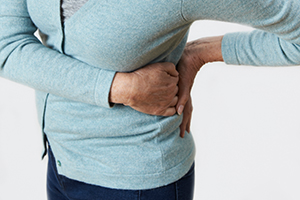Cystinuria Treatment in Stevensville, MD

Do you have bloody urine, pelvic pain, and nausea? You may have kidney stones. If you frequently have kidney stones, you may have a genetic condition called cystinuria.
While this lifelong condition can’t be cured, your medical provider can help you manage symptoms to minimize their impact on your health and quality of life. Medical care can also help you avoid serious complications like kidney failure and bladder damage.
Cystinuria is fairly rare, presenting in 1 of 10,000 people worldwide. To speak with a cystinuria or kidney stone specialist today in Stevensville, call (410) 266-3613 or contact Annapolis Integrative Medicine online.
What are the symptoms of cystinuria?
There are no actual cystinuria symptoms—rather, having this condition causes frequent formation of kidney stones.
Very small kidney stones often pass through your urinary tract without causing pain or complications, but larger ones can get stuck in your kidneys, bladder, and urethra (the tube used to urinate) and cause:
- bloody urine
- severe pain in one side of your body or your back
- nausea and vomiting
- pain near your groin or pelvis
- fever (in some cases)
If left untreated or treated improperly, cystinuria can cause extreme pain and dangerous complications like:
- kidney or bladder damage
- urinary tract infections
- kidney infections
- a urethra blockage that prevents you from urinating (ureteral obstruction)
Symptoms typically first occur in young adults, but it can appear in infants and children in very rare cases. Cystinuria doesn’t affect any other parts of your body, and it rarely causes kidney failure.
If you are experiencing kidney stone symptoms, contact emergency medical attention immediately. Infections can occur, causing severe symptoms that may lead to dramatic complications or even death in extreme cases.
What causes cystinuria?
Cystinuria isn’t a contagious condition, but a genetic mutation inherited from your parents that affects how your body deals with the amino acid cystine.
In healthy individuals, cystine is reabsorbed from your kidneys and filtered out through the blood. Patients with cystinuria have kidneys that are less able to filter cystine, so this amino acid gathers in the kidneys and forms stones. Your body tries to get rid of these stones, but their size, jagged shape, and hardness tends to get them lodged inside your urinary tract.
How is cystinuria diagnosed?
This condition is usually diagnosed after your first experience with kidney stones. Tests are then done to diagnose or rule out cystinuria, including:
- urinalysis: a urine sample collected over 24-hours is taken to a lab to be analyzed
- intravenous pyelogram: an x-ray exam of your kidneys, bladder, and urethra using a dye to help the stones appear
- abdominal CT scan: x-ray images used to locate kidney stones
How is cystinuria treated?
While cystinuria can’t be cured, you can take steps to reduce or eliminate your symptoms. Your provider can also take steps to deal with your kidney stones as they occur. Drinking more water (five to seven liters per day) to increase urination is an important first step.
Shockwave therapy
Other treatments include extracorporeal shockwave lithotripsy (ESWL) and percutaneous nephrostolithotomy. ESWL uses electric shockwaves to break large stones into smaller pieces, though it’s not as effective for cystine stones as it is for other types of kidney stones and may cause kidney damage.
Surgery
Percutaneous nephrostolithotomy is a procedure that passes an instrument through your skin and into your kidney to remove stones or break the apart; side effects include a small chance of infection, bleeding, and injury to nearby organs.
Recurrence rates of cystinuria after surgery are about 45% at three months without further preventative medical treatment. With such treatment, the average recurrence rate drops to 25% at 3 years.
Pharmaceuticals
Alkalinizing medication to adjust your body’s pH balance and make cystine dissolve easier in your urine include sodium bicarbonate and acetazolamide. Side effects of the former include an increase in kidney stones, while the later can cause too much acid in the body and low levels of citrate in the urine.
Other medications that turn the cysteine into a more soluble compound that make it easier to urinate out include d- penicillamine, tiopronin (Thiola, alpha-mercaptopropionylglycine, or alpha-MPG), and captopril. Side effect of these medications may include fever, rash, joint pain, and swollen nymph nodes. Pain medication like ibuprofen can also be used to ease your discomfort when passing stones; side effects include nausea, diarrhea, and headache.
Homeopathy
Homeopathic treatments function in much the same way vaccinations do. Defined as “the treatment of disease by minute doses of natural substances that in a healthy person would produce symptoms of disease”, this practice stimulates the body’s natural ability to heal. Its remedies have been regulated by the FDA since the late 1980s.
Homeopathic treatments to treat kidney stone pain include:
- cantharis: for burning during urination
- ocimum can: for kidney stone accompanied by vomiting
- urtica urens: for kidney stone with high uric acid levels (gout)
- berberis vulgaris: for left-sided kidney stones
- lycopodium: for right-sided kidney stones
- pareira brava: for kidney stones that cause strained, painful urination
Nutritional management
- reducing salt intake and levels of vitamin C and protein
- drinking mineral water and citrus juices to decrease your pH levels
- cranberry juice to remove calcium from your urine to prevent stone formation
- eating magnesium-rich foods like whole wheat that counteracts stone formation
- potassium-rich foods like watermelon help maintain healthy levels of acid in your urine
- eating nettle leaf to promote urination and keep water flowing through your kidneys
Reserve Your Appointment Now
Though you can’t cure or prevent cystinuria, there are many steps you can take to reduce your incidence of kidney stones and their impact on your health and quality of life.
Speaking with your medical provider can help you create a strong foundation for managing it well, such as by using a proper diet, preventative measures, and certain medications.
To speak with a cystinuria or kidney stone specialist today in Stevensville, call (410) 266-3613 or contact Annapolis Integrative Medicine online.
Annapolis Integrative Medicine
Address
1819 Bay Ridge AveSuite 180
Annapolis, MD 21403
(410) 266-3613
www.annapolisintegrativemedicine.com

